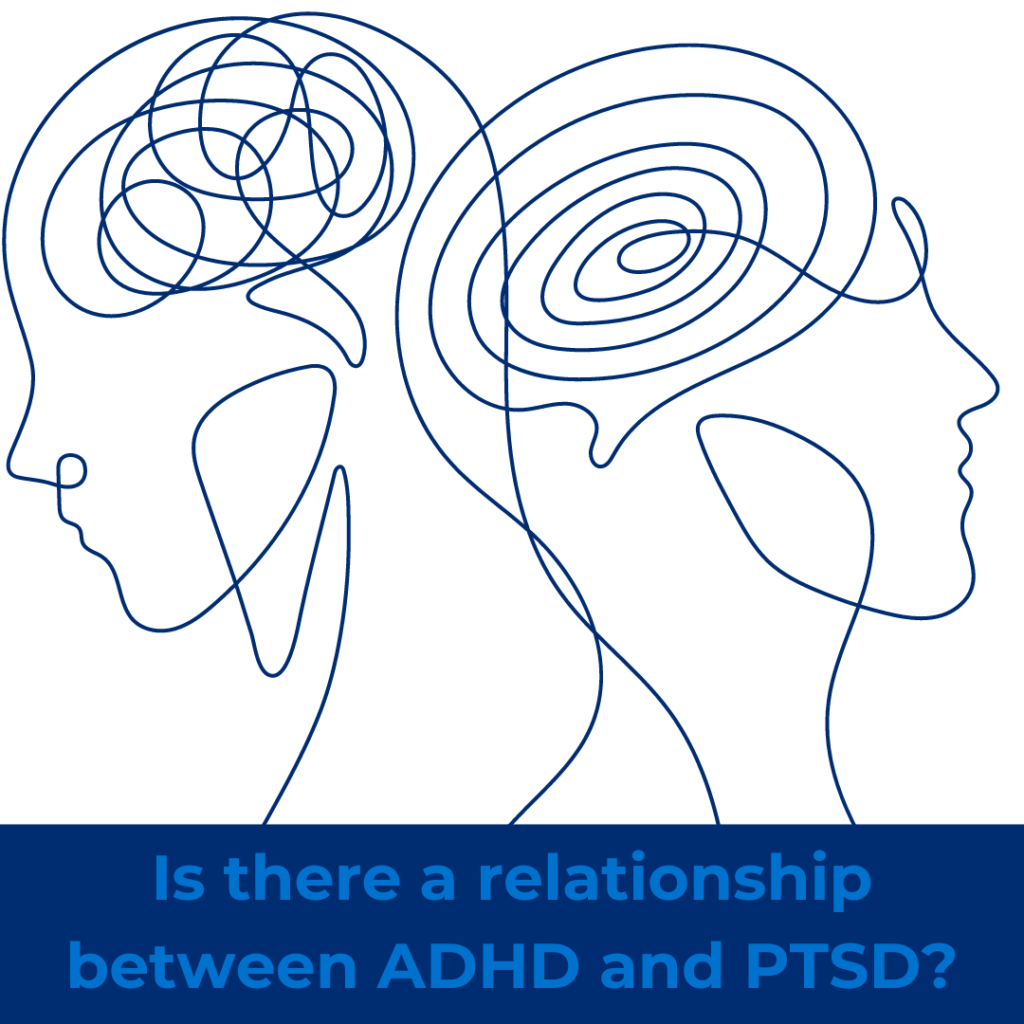Attention-deficit/hyperactivity disorder (ADHD) and posttraumatic stress disorder (PTSD) are two distinct mental health conditions, but they can co-occur in some individuals. There is some evidence to suggest that there may be an association between them. Here’s an overview of ADHD and PTSD.
Common Symptoms:
One of the challenges in understanding ADHD and PTSD is that they can “look” very similar to the untrained eye. For example, both ADHD and PTSD can present with symptoms of hyperarousal. In ADHD, these symptoms are typically related to a biologically driven hyperactive state, people can report feeling like they are driven by a motor inside them. While in PTSD, the heightened state of arousal, is often associated with strong emotional states linked to traumatic experiences and beliefs about safety and danger that have formed due to trauma.
Similarly, what might look like reckless behavior may come from different places. In ADHD impulsivity and inattentiveness may appear as recklessness. These symptoms are to do with brain function and the neurodiversity of ADHD. In contrast those who suffer PTSD can have recklessness in response to traumatic experiences. This experience of reckless or impulsive behaviors is often driven by avoidance of memories or emotions associated with traumatic events.
Avoidance behaviours may look similar in both ADHD and PTSD. However, iIndividuals with PTSD tend to engage in avoidance behaviours to stay away from distress associated with the traumatic experience. In contrast, what may look like avoidance of tasks in an individual with ADHD, is more likely to be procrastination due to executive functioning difficulties. That is difficulties with focusing on instructions, decision making and maintaining concentration.
What does the research say about ADHD and PTSD
The research about ADHD and PTSD indicates that there appears to be an association. THere are several ideas as to why there is this association, but as yet no clear evidence that supports these ideas.
Lenard Adler and colleagues, (2004) studied a small sample of combat veterans using criteria from an older diagnostic manual ( the DSM IV). They found:
- 36% of participants with PTSD and 9% of participants with panic disorder met criteria for childhood ADHD.
- 28% of participants with PTSD and 5% of participants with panic disorder met criteria for current ADHD.
Andrea Spence and her team (2016) conducted a meta analysis of 22 studies examining ADHD in PTSD and PTSD in ADHD. They concluded that their results supported a bidirectional association between ADHD and PTSD. ( A meta-analysis is a statistical analysis that combines the results of multiple scientific studies. )
Similarly, Frank Wendt and his team (2023) assessed siblings with ADHD, and without. They reported that iIndividuals diagnosed with ADHD were at a higher risk for developing PTSD than their undiagnosed sibling.
What is happening?
There is no conclusive evidence as to the association between ADHD and PTSD, however several researchers have suggested ideas.
Lenard Adler and colleagues, (2004) suggested that ADHD or common predisposing factors may increase the vulnerability for developing PTSD. They proposed that one possible mechanism may be that individuals with ADHD may put themselves at greater risk for trauma because of their impulsive nature. They cited that several patients in their study of combat veterans did in fact report choosing dangerous assignments, such as going behind enemy lines. Similarly, they suggested another possibility could be that there may be a tendency for patients with ADHD to have greater exposure to stressful events early in life which might predispose them to significant trauma later in life and subsequently lead to PTSD.
Frank Wednt (2023) and his team suggested that there may be neurobiological underpinnings that are common to ADHD and PTSD. For example, abnormalities in fear circuits.
Differences
There are some key differences between ADHD and PTSD. These differences are important to recognize because they indicate different etiologies and different treatments. Identifying these also helps us understand if someone is experiencing comorbid ADHD and PTSD.
Trauma Exposure
Experiencing a traumatic experience is required for the development and diagnosis of PTSD. Individuals with ADHD may be more prone to engaging in impulsive behaviors or having difficulties with attention and executive functioning, which could potentially lead to increased risk of traumatic experiences. Nonetheless a key difference is if the person has been exposed to traumatic events and if these traumatic events are re-experienced in some way.
Childhood experience
ADHD is a problem that starts in childhood. Having adult ADHD does not mean that you developed the problem in adulthood. It means that you were not diagnosed in childhood. This may mean that your ADHD was explained in other ways. It may mean you were belittled and shamed for something that was not understood.
Diagnostic challenges
It can be challenging to differentiate between ADHD and PTSD because of the shared common symptoms. When a traumatic experience has occurred in childhood the difference in symptomatology may be clouded and difficult to identify. If an individual has suffered abuse from an early age there is a possibility that the individual has had PTSD from childhood. However this does not rule out that they may also have ADHD.
A thorough clinical assessment by a mental health professional is essential to make an accurate diagnosis.
Treatment
The treatment of ADHD and PTSD may involve different approaches. The frontline treatment for ADHD is medication. Behavioural therapies are used to treat co-morbid problems and to build skills to manage difficulties that may occur with ADHD, such as time management. PTSD treatment typically includes evidence-based therapies like cognitive processing therapy (CPT) and sometimes medications. Behavioural treatments such as CPT are the frontline treatments for PTSD. People can recover from PTSD and be asymptomatic. It is important to consider when both conditions co-occur, a comprehensive treatment plan that considers both disorders is essential.
Summary
In summary, There may be an association between ADHD and PTSD, however a lot more research is needed to understand if there is any causality, or increased relative risk associated with either disorder. They can co-occur in some individuals, whilst lay people may find it difficult to distinguish between them. It’s important for individuals who may experience any of these symptoms to seek further assessment. At the Centre for Clinical Psychology, we are competent in the assessment and treatment of ADHD, PTSD, and any other mental health symptoms
References
Adler, L. A., Kunz, M., Chua, H. C., Rotrosen, J., & Resnick, S. G. (2004). Attention-deficit/hyperactivity disorder in adult patients with posttraumatic stress disorder (PTSD): is ADHD a vulnerability factor?. Journal of attention disorders, 8(1), 11–16. https://doi.org/10.1177/108705470400800102
Gurvits, T. V., Gilbertson, M. W., Lasko, N. B., Tarhan, A. S., Simeon, D., Macklin, M. L., Orr, S. P., & Pitman, R. K. (2000). Neurologic soft signs in chronic posttraumatic stress disorder. Archives of general psychiatry, 57(2), 181–186. https://doi.org/10.1001/archpsyc.57.2.181
Spencer, A. E., Faraone, S. V., Bogucki, O. E., Pope, A. L., Uchida, M., Milad, M. R., Spencer, T. J., Woodworth, K. Y., & Biederman, J. (2016). Examining the association between posttraumatic stress disorder and attention-deficit/hyperactivity disorder: a systematic review and meta-analysis. The Journal of clinical psychiatry, 77(1), 72–83. https://doi.org/10.4088/JCP.14r09479
Wendt, F. R., Garcia-Argibay, M., Cabrera-Mendoza, B., Valdimarsdóttir, U. A., Gelernter, J., Stein, M. B., Nivard, M. G., Maihofer, A. X., Post-Traumatic Stress Disorder Working Group of the Psychiatric Genomics Consortium, Nievergelt, C. M., Larsson, H., Mattheisen, M., Polimanti, R., & Meier, S. M. (2023). The Relationship of Attention-Deficit/Hyperactivity Disorder With Posttraumatic Stress Disorder: A Two-Sample Mendelian Randomization and Population-Based Sibling Comparison Study. Biological psychiatry, 93(4), 362–369. https://doi.org/10.1016/j.biopsych.2022.08.012



